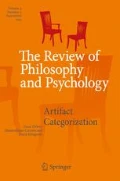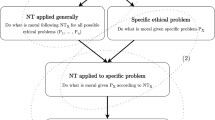Abstract
The evidential value of moral intuitions has been challenged by psychological work showing that the intuitions of ordinary people are affected by distorting factors. One reply to this challenge, the expertise defence, claims that training in philosophical thinking confers enhanced reliability on the intuitions of professional philosophers. This defence is often expressed through analogy: since we do not allow doubts about folk judgments in domains like mathematics or physics to undermine the plausibility of judgments by experts in these domains, we also should not do so in philosophy. In this paper I clarify the logic of the analogy strategy, and defend it against recent challenges by Jesper Ryberg. The discussion exposes an interesting divide: while Ryberg’s challenges may weaken analogies between morality and domains like mathematics, they do not affect analogies to other domains, such as physics. I conclude that the expertise defence can be supported by analogical means, though care is required in selecting an appropriate analog. I discuss implications of this conclusion for the expertise defence debate and for study of the moral domain itself.
Similar content being viewed by others
Notes
Strictly speaking, the expertise defence is typically treated as a defence of philosophical intuition in general, not of moral intuition in particular. See Weinberg et al. (2010) and Williamson (2011). Here I primarily focus on expertise in moral intuition, though I will return to other forms of philosophical intuition in the final section.
In this paper I will not dispute Ryberg’s claims about the nature of expertise in mathematics and chess. But see Clarke-Doane (2012) for recent discussion of the similarities between moral and mathematical epistemology.
Philosophers’ purported reduced susceptibility to bias has been empirically tested, and so far seems dubious. See Schulz et al. (2011); Schwitzgebel and Cushman (2012); Tobia et al. (2012). See also Weinberg et al. (2010) for arguments that philosophical training does not provide the right sort of experience to generate these benefits.
Great thanks to an anonymous referee for helpful suggestions on how to express this point.
I cannot cite empirical evidence (such as surveys) to substantiate my claims about ordinary people’s willingness to render intuitive judgments in the domains of physics, medicine and law. Nor does Ryberg cite empirical evidence to substantiate his claims about their unwillingness to do so in mathematics or chess. In both cases, it seems to be a matter of everyday experience, hopefully shared by the reader.
Something like this notion of expertise (which precedes the current discussion of the “expertise defence”) is defended in Goldman (2001: 91).
Ryberg considers a proposal along these lines, which he calls a “shaping” thesis, “in the same way as, say, a muscle is not generated by previous exercises but shaped by them.” (7). But he rejects this proposal for two reasons. First, he claims that it doesn’t make a difference to his central thesis: per his novice test, it seems that expertise in mathematics or chess really is generated (not shaped) by experience. However, as I have argued, showing a disanalogy to mathematics isn’t enough, if other expertise domains (like physics, etc.) are available for an effective analogy. Ryberg’s second reason for setting aside the “shaping” thesis is more interesting: he thinks that morality is not the sort of domain in which it is possible for experience to improve intuition. I discuss this sort of argument in the next section.
A somewhat related argument avoids taking a position on whether there could be assessable criteria for the quality of moral intuitions, but insists that even if there are such criteria, the actual practice of moral philosophy does not involve engagement with them, and therefore philosophical training should not be thought of as improving the capacity for moral intuition. Weinberg et al. (2010) make an argument of this sort, disputed by Horvath (2010).
Archard (2011, 122) discusses a related challenge to the idea of moral philosophical expertise: “We have clear, evident and agreed criteria for the successful ascent of a mountain or for the repair of a malfunctioning car. We do not have such criteria for the solution of a problem in practical ethics.” Interestingly, Archard dismisses this objection by appealing to analogy; he claims that other (unspecified) academic disciplines display a similar uncertainty of success criteria, yet we still allow that expertise is possible there.
Gesang (2010) cites this feature of moral philosophy as support for moral expertise. If (as Gesang claims) coherentism is an especially plausible model of justification in morality, and if philosophers have more extensive understanding of the principles and general theories that must be made coherent with individual case judgments, then philosophers are in a better theory-constructing position than are the folk (see also Singer 1972). But see Noble (1982) for an argument that philosophers’ technical proficiency actually distracts them from the core subject matter of ethics.
Note that this claim is not the same as the claim that our only defence of perception against scepticism relies upon appeal to perception itself. There may be other ways to defend perception. See e.g. Pryor (2000). The point here is about how to assess the quality of particular perceptual states – and here is it indeed quite hard to see what other standard might be possible.
It might be claimed that physics and medicine do possess independent means of quality-assessment: physical theories predict the behavior of physical entities and medical theories can be checked against the well-being of patients. However, in practice these forms of assessment may not be fully independent; they may require theory-relative observation statements which are themselves only justified by the standards of the relevant theory (Feyerabend 1957). This, of course, is a complicated issue, which I cannot explore further here. But see Flanagan (1982) for a helpful discussion of the relationship between observation-statements in science and ethics.
In particular, we would need to return to Ryberg’s ‘quality’ condition. Can intuitive judgments in metaphysics and epistemology by quality-assessed by means other than the intuitive capacity itself? This is a very difficult matter, too vast to be tackled here. (See Williamson 2007 and Cappelen 2012 for relevant considerations.) In any case, it would certainly be interesting to compare Ryberg’s treatment of moral intuition to these discussions.
The claim that judgment in the legal domain is empirical, inductive or a posteriori might very well be challenged. Certainly some aspects of legal reasoning (such as constitutional interpretation) have elements of formal reasoning. But other aspects (such as applying precedent) can be understood on empirical models. In any event, participants in debates about the nature of jurisprudence, like those in metaethical debates, might wish to consider counterparts of Ryberg’s arguments.
Kant (1785) and Sidgwick (1907) are classic sources of this view. More recent defenders include Nagel (1978); Singer (1981) and Dworkin (1996). Nagel explicitly cites the mathematics analogy as a reason to affirm the a prioricity of moral philosophy: “someone who abandons or qualifies his basic methods of moral reasoning on historical or anthropological grounds alone is nearly as irrational as someone who abandons a mathematical belief on other than mathematical grounds…” (Nagel 1997, 105).
I owe great thanks for comments on earlier drafts to Kimberley Brownlee, Guy Kahane, Michael Strevens, and to the editor and referees for Review of Philosophy and Psychology. This research was supported by the Volkswagen Stiftung’s European Platform for Life Sciences, Mind Sciences, and the Humanities (grant II/85 063).
References
Alexander, J. 2012. Experimental philosophy: An introduction. 1st ed. Polity.
Archard, David. 2011. Why moral philosophers are not and should not be moral experts. Bioethics 25(3): 119–127.
Baier, Annette. 1985. Theory and Reflective Practices. In Postures of the mind. Minneapolis: University of Minnesota Press.
Cappelen, H. 2012. Philosophy without intuitions. Oxford University Press.
Clarke-Doane, J. 2012. “Moral epistemology: the mathematics analogy*.” Noûs: Online Access. doi:10.1111/j.1468-0068.2012.00875.x.
Dewey, John. 1922. Human nature and conduct: An introduction to social psychology. New York: Modern Library, Inc.
Dworkin, Ronald. 1996. Objectivity and truth: you’d better believe it. Philosophy & Public Affairs 25(2): 87–139.
Feyerabend, P.K. 1957. An attempt at a realistic interpretation of experience. Proceedings of the Aristotelian Society 58: 143–170.
Flanagan, Owen. 1993. Varieties of moral personality: Ethics and psychological realism. Cambridge: Harvard University Press.
Flanagan, Owen J. 1982. Quinean ethics. Ethics 93(1): 56–74.
Gesang, Bernward. 2010. Are moral philosophers moral experts? Bioethics 24(4): 153–159.
Goldman, Alvin I. 2001. Experts: which ones should you trust? Philosophy and Phenomenological Research 63(1): 85–110.
Horvath, Joachim. 2010. How (not) to react to experimental philosophy. Philosophical Psychology 23(4): 447–480.
Kant, I. 1785. Groundwork for the metaphysics of morals. Translated by Allen W. Wood. New Haven, CT: Yale University Press.
Kitcher, Philip. 2011. The ethical project. Cambridge: Harvard University Press.
Ludwig, Kirk. 2007. The epistemology of thought experiments: first person versus third person approaches. Midwest Studies in Philosophy 31(1): 128–159.
Nado, J. 2012. “Why intuition?” Philosophy and Phenomenological Research: Online Access. doi:10.1111/j.1933-1592.2012.00644.x.
Nagel, Thomas. 1978. Ethics as an autonomous theoretical subject. In Morality as a biological phenomenon: The presuppositions of sociobiological research, ed. Gunther S. Stent, 198–205. Berkeley: University of California Press.
Nagel, Thomas. 1997. The last word. Oxford: Oxford University Press.
Noble, Cheryl N. 1982. Ethics and experts. The Hastings Center Report 12(3): 7–9.
Nussbaum, M.C. 2003. Upheavals of thought: The intelligence of emotions. Cambridge University Press.
Pryor, James. 2000. The skeptic and the dogmatist. Noûs 34(4): 517–549.
Rawls, John. 1971. A theory of justice, 1st ed. Cambridge: Harvard University Press.
Ryberg, Jesper. 2013. Moral intuitions and the expertise defence. Analysis 73(2): 3–9.
Schulz, Eric, Edward T. Cokely, and Adam Feltz. 2011. Persistent bias in expert judgments about free will and moral responsibility: a test of the expertise defense. Consciousness and Cognition 20(4): 1722–1731.
Schwitzgebel, Eric, and Fiery Cushman. 2012. Expertise in moral reasoning? order effects on moral judgment in professional philosophers and non-philosophers. Mind and Language 27(2): 135–153.
Sidgwick, H. 1907. The methods of ethics. Hackett.
Singer, Peter. 1972. Moral experts. Analysis 32(4): 115–117.
Singer, Peter. 1981. The expanding circle: Ethics and sociobiology. Oxford: Oxford University Press.
Sinnott-Armstrong, W. 2008. “Framing moral intuition.” In Moral Psychology, Vol 2. The cognitive science of morality: Intuition and diversity, 47–76. Cambridge, MA: MIT Press.
Tobia, K., Wesley, B., and S. Stich. 2012. “Moral intuitions: are philosophers experts?” Philosophical Psychology: Online Access. doi:10.1080/09515089.2012.696327.
Weinberg, Jonathan M., Chad Gonnerman, Cameron Buckner, and Joshua Alexander. 2010. Are philosophers expert intuiters? Philosophical Psychology 23(3): 331–355.
Williams, Bernard. 1985. Ethics and the limits of philosophy. Cambridge: Harvard University Press.
Williamson, T. 2007. The philosophy of philosophy. Wiley-Blackwell.
Williamson, Timothy. 2011. Philosophical expertise and the burden of proof. Metaphilosophy 42(3): 215–229.
Williamson, T. 2013. “Book review: Experimental philosophy: An introduction by Joshua Alexander.” Philosophy Online Access. doi:10.1017/S0031819113000259.
Author information
Authors and Affiliations
Corresponding author
Rights and permissions
About this article
Cite this article
Rini, R.A. Analogies, Moral Intuitions, and the Expertise Defence. Rev.Phil.Psych. 5, 169–181 (2014). https://doi.org/10.1007/s13164-013-0163-2
Published:
Issue Date:
DOI: https://doi.org/10.1007/s13164-013-0163-2



